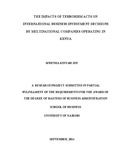| dc.description.abstract | Terrorism can negatively impact growth, investment and trade flows. This research study was
aimed at identifying the impacts of terrorism acts on international business investment decisions
by multinational companies operating in Kenya. The issue of global terrorism has assumed a
frightening and dangerous dimension across the globe to an extent that an individual’s safety in a
nation cannot be absolutely guaranteed, Kenya in the recent past has experienced its share of
terrorism and terrorist related activities with big magnitudes reported in Nairobi and Mombasa
counties. Terrorism raises the risk and cost of doing business irrespective of the nature of
business. The main objective of this research were to understand how terrorism acts have
impacted on international business investment decisions by multinational companies operating in
Kenya and to seek out possible mitigating measures of terrorism risk. The value of the study is to
assist the international firms in the analysis of direct and indirect effects of terrorism on business
investment decisions in order to come up with business continuity plans, business resilience
strategies, crisis management programs and disaster planning and recovery measures for the
business survival in the event of and after the acts of terrorism. Though political factors are not
only determinants which decide the whole investment decision by multinational firms many
empirical studies have found the correlation between political factors and investment decision.
The study used a descriptive survey research design to explain how terrorism has impacted on
international business investment decisions by the multinational firms operating in Kenya. The
target population was multinational firms operating in Kenya.The researcher targeted 20
multinational companies whose list is attached as appendix three. The researcher got a sample
size of five multinational firms. The researcher also used systematic random sampling to come
up with a sample size. Structured questionnaires were used to collect primary data. The questions
format was based on a five point Likert scale. The researcher obtained an official introduction
letter from the University of Nairobi to clarify to the audience the purpose of study. Upon
receiving clearance the researcher distributed the questionnaires. After distributing and collecting
the questionnaires, they were coded and edited for completeness using the statistical package for
social services SPSS. Quantitative data was analysed using descriptive techniques like
frequencies distribution, percentages, means, modes, medians and standard deviations. In
addition correlation analysis was done to establish the relationships that exist between the level
of terrorism and international business operations in Kenya. Eventually data was presented using
frequency tables. The study observed that international business investment of multinational
companies was clearly affected by the level of terrorism acts in the country. Foreigners were
more likely to invest in multinational companies that did not prove a threat to the investments
made. It was also evident from the research that terrorism acts in the country increased the cost
of security to the MNCs thereby reducing the level of return on investments in these firms.
Terrorism acts affected growth, development and financial performance of these multinational
firms it was noted that most respondents believed that increased terrorism acts affected the daily
routine of these firms hence causing a reduction in return on investments, growth and
development of the multinational companies. This research paper concludes that if a country
does not confront its political problems, it is obvious that the country will be excluded in the list
of future investment plan of multinational companies. To determine and to get rid of the major
political barriers and risks to foreign investment development is the first step which Kenya
should exercise in order to attract more inward foreign investment. | en_US |

